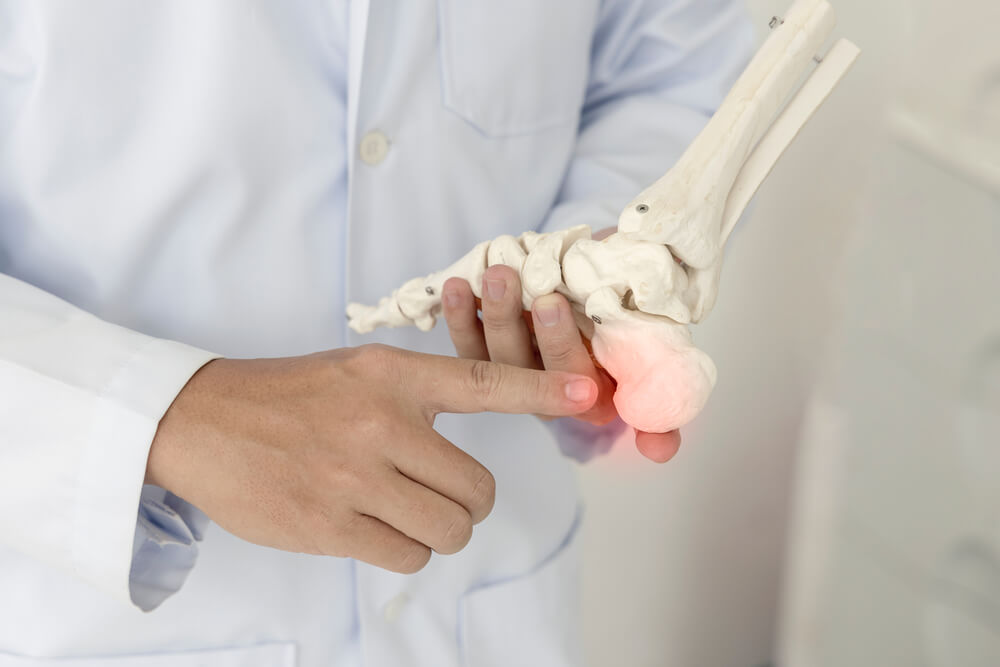
Heel pain is a common ailment experienced by many, often attributed to various benign causes such as plantar fasciitis, Achilles tendonitis, or heel spurs. However, it’s essential to understand that heel pain can sometimes be indicative of more serious underlying health issues, including certain types of cancer. While not all instances of heel pain are related to cancer, being informed about the potential connection can be crucial for early detection and treatment.
Certain cancers can manifest symptoms that include heel pain due to metastasis or pressure on nerves and tissues in the area. For instance, cancers such as bone cancer or soft tissue sarcomas might present with localized pain in the heel as part of their symptomatology. It’s important for individuals experiencing persistent or unexplained heel pain to consider consulting a healthcare professional who can evaluate these symptoms comprehensively.
Understanding the potential medical conditions linked to heel pain involves recognizing both common and uncommon causes. While most cases are non-cancerous and treatable with conservative methods like rest, ice application, and physical therapy, awareness of more serious possibilities ensures that individuals seek timely medical advice when necessary. By exploring the connection between heel pain and cancer symptoms thoroughly, we empower ourselves with knowledge that could potentially lead to early diagnosis and better health outcomes.
Common Causes of Heel Pain (From Plantar Fasciitis to Stress Fractures)
Heel pain is a prevalent issue that can significantly impact daily activities and quality of life. Understanding the common causes of heel pain is essential for effective treatment and prevention. One of the most frequent culprits is plantar fasciitis, which occurs when the thick band of tissue running across the bottom of your foot becomes inflamed. This condition often results in sharp, stabbing pains, particularly noticeable during the first steps in the morning.
Another common cause is a heel spur, a calcium deposit that forms on the underside of the heel bone. While not always painful itself, it often accompanies plantar fasciitis and can exacerbate discomfort.
A stress fracture in the foot can also lead to persistent heel pain. These small cracks in a bone are typically caused by repetitive force or overuse, common among athletes or individuals who suddenly increase their activity levels.
Achilles tendinitis is another condition contributing to heel pain. It involves inflammation of the Achilles tendon, which connects your calf muscles to your heel bone. This condition often arises from increased physical activity without proper conditioning or stretching.
Recognizing these common causes is crucial for seeking appropriate treatment and effectively alleviating discomfort.
Less Common Medical Conditions Associated with Heel Pain

Heel pain can be a frustrating and debilitating issue, often stemming from common conditions like plantar fasciitis or Achilles tendinitis. However, there are several less common medical conditions that could also be responsible for heel discomfort. Understanding these can help in seeking appropriate treatment and relief.
One such condition is Baxter’s nerve entrapment, which occurs when the inferior calcaneal nerve becomes compressed. This nerve runs along the heel and can cause sharp, burning pain on the inside of the heel when entrapped. Diagnosis often involves clinical examination and imaging studies to rule out other causes of heel pain.
Another potential culprit is tarsal tunnel syndrome, a condition similar to carpal tunnel syndrome in the wrist. It involves compression of the posterior tibial nerve as it travels through the tarsal tunnel near the ankle. Symptoms include tingling, numbness, or shooting pain that may extend from the heel into the arch of the foot.
Rheumatoid arthritis is also known for causing foot-related issues, including rheumatoid arthritis foot pain that can affect various parts of the foot, including heels. This autoimmune disorder leads to inflammation in joints and tissues, potentially resulting in chronic discomfort and deformity if not managed properly.
For individuals experiencing persistent or unexplained heel pain, consulting with a healthcare professional for an accurate diagnosis is crucial. Identifying these less common conditions early on can lead to more effective treatment strategies and improved quality of life.
Cancer-Related Symptoms That Could Be Mistaken for Heel Pain Causes
When it comes to heel pain, most people might immediately think of common causes like plantar fasciitis or Achilles tendonitis. However, it’s important to be aware that certain cancer-related symptoms can also manifest as heel pain, and recognizing these signs early can be crucial for timely intervention.
One potential cause is bony metastasis, where cancer cells spread from their original site to the bones. This can lead to persistent bone pain that may initially be mistaken for typical heel discomfort. Unlike ordinary heel pain, bony metastasis symptoms often include deep aching sensations and may not improve with rest or traditional treatments.
Another condition to consider is soft tissue sarcoma in the foot. While rare, this type of cancer can cause localized swelling and tenderness in the affected area. The symptoms might resemble those of more benign conditions but tend to persist despite standard care measures.
Lastly, cancer-related leg pain should not be overlooked as a potential source of heel discomfort. This type of pain might radiate down from other areas due to nerve compression or involvement by a tumor elsewhere in the body.
Understanding these possible connections between cancer-related conditions and heel pain is vital for both patients and healthcare providers. If you experience persistent or unexplained heel pain that doesn’t respond to conventional treatments, consulting with a medical professional for further evaluation could help rule out serious underlying issues such as these.
When Should You Consult a Doctor About Heel Pain?
Heel pain is a common ailment that many people experience at some point. However, it can be difficult to know when it’s time to consult a doctor about this issue. Understanding the signs and symptoms that warrant medical attention is crucial for proper diagnosis and treatment.
If you experience persistent heel pain that does not improve with home remedies such as rest, ice, or over-the-counter pain relievers, it may be time to see a doctor. Persistent heel pain could indicate underlying conditions like plantar fasciitis or Achilles tendinitis, which require professional evaluation and management.
Another critical factor to consider is if your heel pain is accompanied by unexplained weight loss. This combination of symptoms could suggest a more serious health issue that needs immediate medical attention. In such cases, it’s important not to delay seeking advice from a healthcare professional who can provide an accurate diagnosis and appropriate treatment plan.
Additionally, if your foot pain results in difficulty walking or performing daily activities comfortably, consulting with a doctor becomes essential. They can assess whether there are biomechanical issues contributing to your discomfort and recommend suitable interventions.
While occasional heel pain might resolve on its own, persistent discomfort or associated symptoms like unexplained weight loss should prompt you to seek medical advice promptly for an accurate diagnosis and effective treatment strategy.
The Importance of Early Detection and Diagnosis in Cancer Treatment
Early detection and diagnosis play a crucial role in the successful treatment of cancer. One of the primary benefits of early cancer detection is that it often leads to more effective treatment options and improved survival rates. When cancer is identified at an early stage, it typically means that the disease has not yet spread extensively, allowing for a broader range of treatment possibilities that can be less invasive and more targeted.
Medical screenings for early diagnosis are essential tools in this process. Regular screenings such as mammograms, colonoscopies, and Pap smears are designed to catch signs of cancer before symptoms even appear. These medical screenings can significantly increase the chances of detecting cancers at a stage when they are most treatable.
The importance of regular health check-ups cannot be overstated in the context of cancer prevention and management. Routine visits to healthcare providers allow individuals to stay informed about their health status and enable doctors to monitor any changes over time. This proactive approach ensures that any potential issues are addressed promptly, reducing the risk of late-stage diagnoses.
Prioritizing early detection through consistent medical screenings and regular health check-ups empowers individuals with better outcomes in cancer treatment by facilitating timely intervention strategies.
